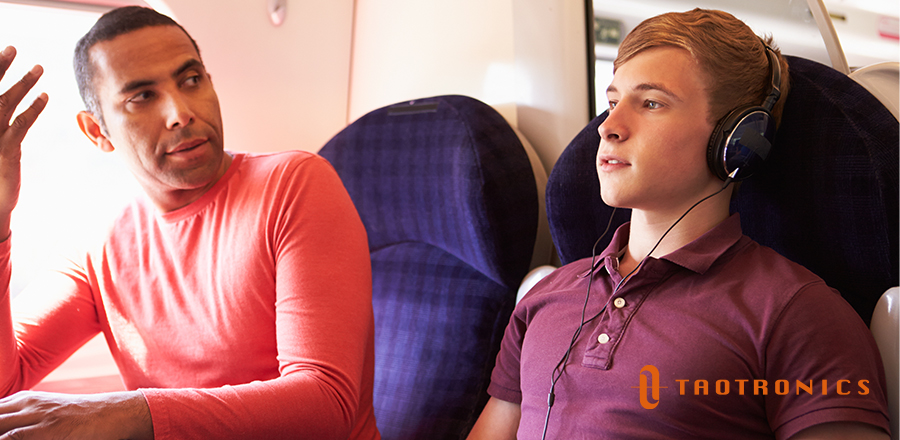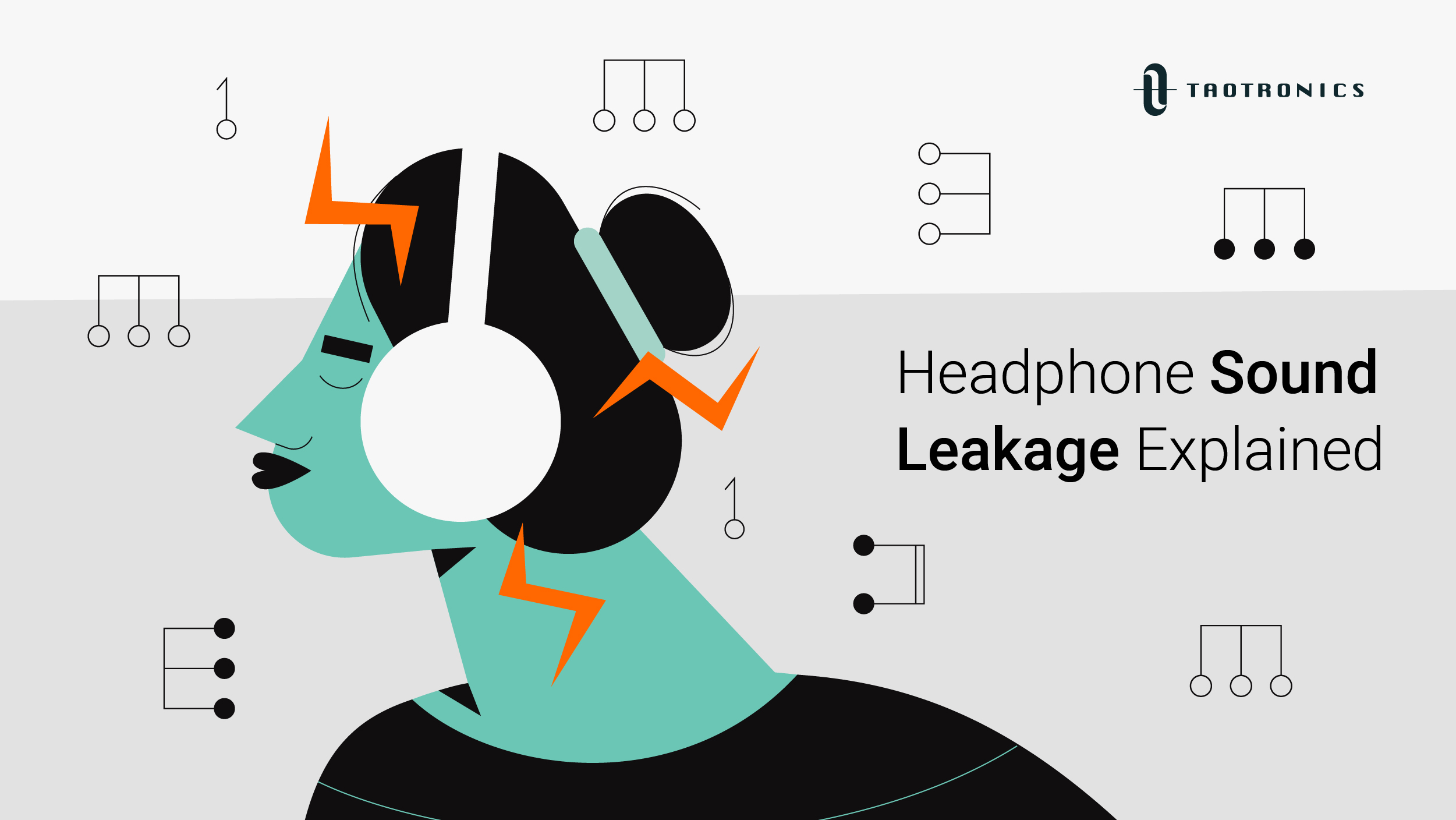Not long ago, this writer was sat on the subway listening to some upbeat music on the way to work. The thud of the bass and the harmonized voices were keeping me awake first thing in the morning. I slumped in my garishly patterned seat, staring blankly and urging the caffeine from my morning coffee to kick in as I tried not to nap on the humid, sweaty train.
Suddenly, my neighbor dug their elbow into my arm. “Your music is so loud. Turn it down!”
I was confused—how could they hear my music so clearly? One quick Google later and I realized. My headphones were having a serious audio bleed, leaking my music to the outside world.
Headphone sound leakage sounded almost dangerous. Were my headphones leaking fluid? What if my headphone sound is leaking into the mic? Headphone bleed sounds messy. Can it affect your hearing in any way??!
A Problem with a Solution
So, I did some research. In reality headphone sound leakage really isn’t that terrible, and I was relieved to hear sound leakage doesn’t damage your hearing. And it has absolutely nothing to do with real life blood.
But sound leakage is annoying! And embarrassing, if you’re listening to a guilty pleasure. So, we at TaoTronics want to help you organize a headphone sound leak fix.
In this blog, we cover what a headphone sound leak is and how you can find out if you have one. We also look at when and audio bleed is problematic, and what you can do about it. Yes, that’s right—we even tell you about the best wireless headphones that don’t leak sound. We’ll help you make sure your next pair of headphones blast music into your ears, not the outside world.
What is Headphone Sound Leak?
Firstly, headphone sound leakage is exactly what it sounds like—your headphones letting your music escape into the space around you as they channel music into your ears. To illustrate, think of it like a faucet. When you turn it on, you expect water to come out of the opening. When there are leaks in the pipe, less water comes through, and water spills into places it isn’t wanted.
You might also hear the term audio bleed. This term can be used interchangeably and isn’t any more serious than a leakage.
All headphones usually leak sound a bit. When you listen to music at low volume, you probably won’t notice it at all. However, louder music and certain designs of headphones can leak so much audio that the person next to you might be treated to a full (and unwanted) concert.
The 2 Main Factors in Headphone Leakage

There are two main reasons that your headphones are leaking sound. All of them are design related—if you have bought cheap headphones that aren’t built to last, then reading this will explain why investing in good audio devices makes a huge difference.
You’ll notice as well that size and style of headphone affects leakage. If this is something that is really bothering you, getting in-ear true wireless headphones with noise isolation, or buying over-ear noise cancelling headphones should immediately reduce your chances of audio bleed.
1) Headphone driver (or transducer) size
Headphone drivers, as we explained in a previous blog, are the part of your headphones that convert electrical signals into sound. There are plenty of different types to choose from, changing based on the type of headphones you go for and the size of headphones you want.
Usually, if you have a smaller driver, there will be less sound leakage. Smaller drivers are used with smaller headphones, like in-ear earbuds and True Wireless headphones. So, your earbuds should have less audio bleed, but this isn’t always the way. Other factors are also involved, including the headphone enclosure.
2) Enclosure
Headphones are designed in two main ways: Open back and closed back. Open back headphones will usually leak a lot more than closed, which isn’t surprising. They allow more ambient noise to accompany your audio, so it makes sense that they would also leak more music into the outside world. Buying headphones with closed backs is better if you want to prevent sound leaks.
Why Should You Care About Sound Leakage in Headphones?
“Ok,” I hear you say to yourself. “My headphones are leaking sound. But the music still sounds good, and no one around me has complained yet. Why should I care?”
As a matter of fact, it should bother you. Because if your headphones are leaking sound, that means you aren’t getting the full audio experience you deserve.
When Does Headphone Leakage Matter?
Your headphones aren’t leaking fluid, so why should you be worried about headphone sound leaks? Well… leaks matter in a lot of different situations.
- In any situation where you are surrounded by people (on your commute, in your office, etc.)
- When you want to hear full clear audio.
- When you are in a loud environment with a lot of ambient noise (on public transportation or walking down the street, for example).
This is because a sound leak will affect everyone around you, and as a consequence stop you hearing high quality music at lower volumes. The louder your volume is, the more everyone is affected.
How does sound leakage affect headphone performance?
As we mentioned previously, you will be less likely to hear your full audio soundstage when you have an audio bleed. This means your audio quality is effectively lower.
What type of headphones leaks the most?
As we talked about before, larger headphones with less noise isolating qualities are more likely to leak. This means over-ear, open-back headphones are more likely to leak than True Wireless in-ear earbuds.
PLEASE INSERT THIS VIDEO HERE:
To illustrate, you can watch this video that demonstrates the difference between open and closed back headphones.
Why is reducing headphone sound leakage important?
So, here is the thing. A leak isn’t the most important thing for you to worry about, especially if you don’t mind people being able to hear your music. You might even have been expecting it if you bought cheaper headphones.
However, if you care about audio quality and want a more immersive and better audio experience, you should reduce sound leakage. It will also stop you annoying your colleagues and anyone sitting near you on the commute. Though, in 2020, it might be a good deterrent to keep everyone 6 feet away from you!
How to Test for Sound Leakage in Your Headphones
Testing for headphone sound leakage is straightforward. It won’t take too long, so it’s always worth your time. All you need is a willing friend and some good music.
Step One: Find a Friend (with some headphones!)
You can start by finding a friend who also has some headphones. Ideally a different pair to you. This is so that
- you have a person who can tell you if your headphones are leaking; and,
- so you can compare your headphones and see if the leak is normal or extreme.
Step Two: Put your headphones in (or ask your friend to wear them!)
Step Three: Play music through your headphones while your friend stands a couple of meters away (a great social distancing activity!)
Step Four: Can you or your friend hear the music clearly?
Make sure that you start the volume low and turn it up bit by bit, to tell exactly when the leakage gets bad.
TOP TIP
Do this experiment in a quiet room, so that you and your friend aren’t distracted or confused by ambient noise.
6 Tips to Prevent Headphones from Leaking Sound
What happens if you discover your headphones leak sound? If the answer is yes, is there an easy headphone sound leak fix?
Don’t worry, there are some ways you can improve your situation. Some of these do just involve buying new headphones, and you can look at our next section for the best wireless headphones that don’t leak sound. Here, we’ll look at some things that you can also do without splashing cash.
1. Use foam ear tips and earpads
Foam ear tips are better for preventing sound leakage than silicone tips. This is because they offer greater sound isolation, although they can also wear out more quickly over time.
2. Cover your earbuds with your hands
It’s old school, but an easy fix! Make sure your headphones are covered with your hands to add an extra layer of protection. If you’re stuck while your new headphones are in the mail, this is an easy way to stop your neighbors being bothered by your music.
3. Use bone conduction headphones
Ever heard of bone conduction? These headphones help you listen to your favorite tunes via vibrations. We wrote a whole blog about bone conduction sunglasses where you can learn more about the technology.
4. Use noise-isolation headphones
Noise isolation headphones work hard to keep ambient noise out—and your audio in your ears. This technology is different to noise cancellation as it works to block these sounds through in-ear earbud design, rather than cancelling the soundwaves.
5. Use a pair of ear-protection earmuffs
Something that might work well over winter is adding a pair of earmuffs over your headphones. This adds another layer for the sound to get through, increasing the noise isolation of your earbuds.
6. Turn your volume down
Obviously, the louder your music, the more leakage there is likely to be. So, you should make sure you turn down your volume if you are around people. This can be hard on your commute, when the subway is very loud. But it is better for the health of your ear overall.
The Best Headphones That Don’t Leak Sound
As usual, we are here to provide you with a run-down of the best headphones to help your situation. While this isn’t exactly a headphone sound leak fix, buying a new pair of well-designed headphones is probably the easiest way to make sure your headphones aren’t leaking sound.
TaoTronics Headphones Have Minimal Sound Leakage
Immersive experiences are a TaoTronics specialty. We don’t want you to have to worry about someone next to you hearing your music—that takes you out of the moment. Instead, we design our headphones to ensure they leak as little as possible.
TaoTronics SoundLiberty 94

Undoubtedly, one of our most impressive pairs of headphones is SoundLiberty 94. These True Wireless, noise cancelling earbuds are precision built for Hi-Fi type audio, creating an immersive experience. Because of their features, you’re less likely to suffer from an audio bleed.
Our SoundLiberty 94 earbuds include:
- Advanced noise cancellation (ANC) technology.
- Inward and outward microphone, reducing the opportunity of headphone sound leaking into your mic.
- 9.2mm Hi-Fi dynamic drivers, small but powerful.
- In-ear design that creates natural noise isolation.
- Waterproof and sweatproof build, so less likely to break when exposed to water and create potential issues with sound leakage.
To summarize, we recommend these as the best headphones that don’t leak sound. You can learn more about SoundLiberty 94 True Wireless earbuds at our website.
Conclusion
Ultimately, there is an easy headphone sound leak fix: Buy better headphones! But if you don’t want to, our guide has covered everything you can do to improve your audio quality by stopping leaks. No headphones are perfect, and each will bleed sound a bit. But following our tips gives you the best chance to not bother people around you with your music.
Check out the full range of TaoTronics headphones at our website!
- Celebrate Labor Day: Discounts from TaoTronics - April 23, 2021
- How to Connect Bluetooth Headphones to Your Macbook Pro or iMac - April 9, 2021
- Headphone Earpads Full Guide: Replacements, Covers, and more! - March 26, 2021
